新编英语教程5课文翻译(unit6~12)
新编英语教程第三版第5册Unit6-10重点词汇短语语言点

新编英语教程第三版第5册Unit6-10重点词汇短语语言点Unit61.Join in a symposium on sth./be included on the program参加一个有关...的研讨会2.Symposium seminar conference convention注意区分3.anchorman新闻节目主播4.Distinguished extinguish distinct distinctive instinct extinct5.To the core彻底地道的6.Aggressive progress progression regress digress7.Savvy:well-informed and perceptive:shrewd精明能干的有见识的8.Solid:definitely good and steady but perhaps not excellent or special相当不错的(但谈不上特别或出色的)9.In the ways and means在各方面10.,as i understand it,我认为11.Scrutinize:to observe or examine with great care~the diamond for flaws仔细察看钻石有无瑕疵12.Address a question to sb.提出问题13.Colleague college collage14.Prone be prone to...有。
倾向的15.Distortion歪曲扭曲事实的陈述16.React as though+从句17.Be blamed for/scold fault condemn因...而受到责难18.Deal with有关关于this is a book dealing with sth.19.Downside n.负面消极面20.At most至多;最迟21.Be apt to22.Sniper狙击兵23.Devalue贬值=devaluate24.Solely完全单独独自25.Collide with与...相撞26.Misshapen畸形的27.Catastrophe:a sudden event that causes many people to suffer灾难;灾祸;横祸28.Change for the better29.Underinformed&overinformed了解不足&知之甚多30.In turn转而31.Defeatism:an attitude to expect not to succeed32.Inhibitor抑制剂抑制者33.An unrelieved diet of=all coverage of比喻意多得令人生厌的事物Unrelieved:(formal)(of an unpleasant situation令人不快的情况)continuing without changing 持续不变的;未缓和的34.Deplete使空虚使消耗~sth of sthSurely it is an economic nonsense to deplete the world of natural resources.耗尽世界的自然资源毋庸置疑是愚蠢的经济行为。
高级英语 新编英语教程5 课文+翻译 unit5
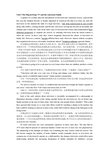
Unit 5 The Plug-in Drug: TV and the American FamilyA quarter of a century after the introduction of television into American society, a period that has seen the medium become so deeply ingrained in American life that in at least one state the television set has attained the rank of a legal necessity, 1safe from repossession in case of debt along with clothes, cooking utensils, and the like, television viewing has become an inevitable and ordinary part of daily life. Only in the early years of television did writers and commentators2have sufficient perspective to separate the activity of watching television from the actual content it offers the viewer. In those early days writers frequently discussed the effects of television on family life. However a curious 3myopia afflicted those early observers: almost without exception they regarded television as a favorable, beneficial, indeed, 4wondrous influence upon the family.在电视机这项发明进入美国人生活的25后,他已经在美国人的生活中根深蒂固,甚至美国至少有一个州的法律规定电视机是生活的必须品,而且如果负债,它可以和衣物,厨具一样免于作为财产抵押,而且看电视也成为人们生活中非常普遍甚至是不可避免的活动。
李观仪《新编英语教程》第5册 UNIT6
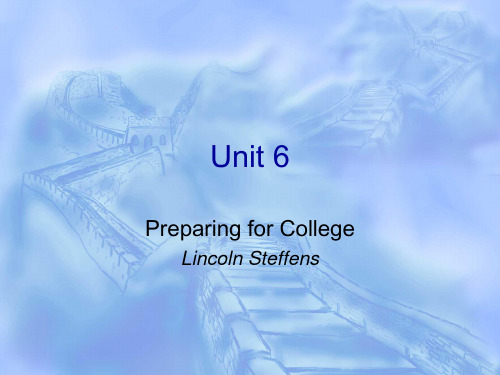
Tory A member of a British political party, founded in 1689, that was the opposition party to the Whigs and has been known as the Conservative Party since about 1832. 托利党党员创建于1689年,作为辉格党对立党而存在的英国 政党党员,1832年以后托利党名为保守党 A member of a Conservative Party, as in Canada. 保守党党员加拿大等国保守党的党员 Often tory 常作tory A supporter of traditional political and social institutions against the forces of democratization or reform; a political conservative. 保守主义者;顽固派留恋过去的政治和社会体制,反对民主 或改革力量的人;政治上的保守主义者 Tory n. 保守党党员, 保皇党人 adj.保守分子的 Toryism n. 保王主义[行为]; [常t-]保守主义[行为]
Whig A member of an 18th- and 19th-century British political party that was opposed to the Tories. 辉格党党员18及19世纪英国的政党成员,该政党与托利党相 对立 Probably short for Whiggamore, a member of a body of 17th-century Scottish Presbyterian rebels 可能源自 Whiggamore的缩写,17世纪苏格兰一团体的成员 Whig n. [英](自由党前身的)辉格党党员;[美](共和党前身的) 自由党党员;辉格党[自由党]的支持者 Labour Party n (英国)工党 Robert Owen 欧文,罗伯特1771-1858威尔士裔的英国制造商和社会改革 家,他试图在印第安那的新哈莫尼建立一协会
全新版大学英语综合教程5 unit1 课后答案

1.(1) allot
(2) go through fire and water
(3) reside
(4) sobbed
(5) made no mention of
(6) sacrifice
(7) came upon
(8) rhythm
2. She had thought that books were natural wonders, coming up of themselves like grass. So it was "startling and disappointing" for her to find out that story books had been, contrary to her expectations, written by people.
(8) Answer: an old Ford
P24 cloze
(1) Answer: go through fire and water
(2) Answer: salary
(3) Answer: give
(4) Answer: no peace
(5) Answer: sink into
(7) inward
5. (1) Answer: have come upon / across
(2) Answer: had come out
(3) Answer: come on / up
(4) Answer: came across
(5) Answer: comes down to
7. The book was completely worn out - it was lacking its front cover, the back held on by strips of pasted paper, and the pages stained; its illustrations had come unattached. Welty's father had lost his mother when he was seven, and this book was the only book he as a little boy had had of his own. Although he had never made any mention to his own children of the book, he had brought it along with him from Ohio to their house and shelved it in their bookcase.
新编英语教程5(1-12)课文翻译
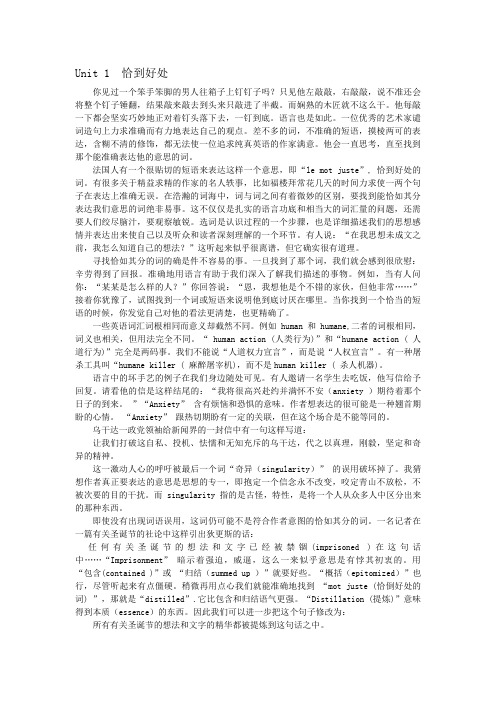
Unit 1 恰到好处你见过一个笨手笨脚的男人往箱子上钉钉子吗?只见他左敲敲,右敲敲,说不准还会将整个钉子锤翻,结果敲来敲去到头来只敲进了半截。
而娴熟的木匠就不这么干。
他每敲一下都会坚实巧妙地正对着钉头落下去,一钉到底。
语言也是如此。
一位优秀的艺术家谴词造句上力求准确而有力地表达自己的观点。
差不多的词,不准确的短语,摸棱两可的表达,含糊不清的修饰,都无法使一位追求纯真英语的作家满意。
他会一直思考,直至找到那个能准确表达他的意思的词。
法国人有一个很贴切的短语来表达这样一个意思,即“le mot juste”, 恰到好处的词。
有很多关于精益求精的作家的名人轶事,比如福楼拜常花几天的时间力求使一两个句子在表达上准确无误。
在浩瀚的词海中,词与词之间有着微妙的区别,要找到能恰如其分表达我们意思的词绝非易事。
这不仅仅是扎实的语言功底和相当大的词汇量的问题,还需要人们绞尽脑汁,要观察敏锐。
选词是认识过程的一个步骤,也是详细描述我们的思想感情并表达出来使自己以及听众和读者深刻理解的一个环节。
有人说:“在我思想未成文之前,我怎么知道自己的想法?”这听起来似乎很离谱,但它确实很有道理。
寻找恰如其分的词的确是件不容易的事。
一旦找到了那个词,我们就会感到很欣慰:辛劳得到了回报。
准确地用语言有助于我们深入了解我们描述的事物。
例如,当有人问你:“某某是怎么样的人?”你回答说:“恩,我想他是个不错的家伙,但他非常……”接着你犹豫了,试图找到一个词或短语来说明他到底讨厌在哪里。
当你找到一个恰当的短语的时候,你发觉自己对他的看法更清楚,也更精确了。
一些英语词汇词根相同而意义却截然不同。
例如human 和humane,二者的词根相同,词义也相关,但用法完全不同。
“ human action (人类行为)”和“humane action ( 人道行为)”完全是两码事。
我们不能说“人道权力宣言”,而是说“人权宣言”。
有一种屠杀工具叫“humane killer ( 麻醉屠宰机),而不是human killer ( 杀人机器)。
Unit 1 Love of reading全新版大学英语综合教程五课文翻译
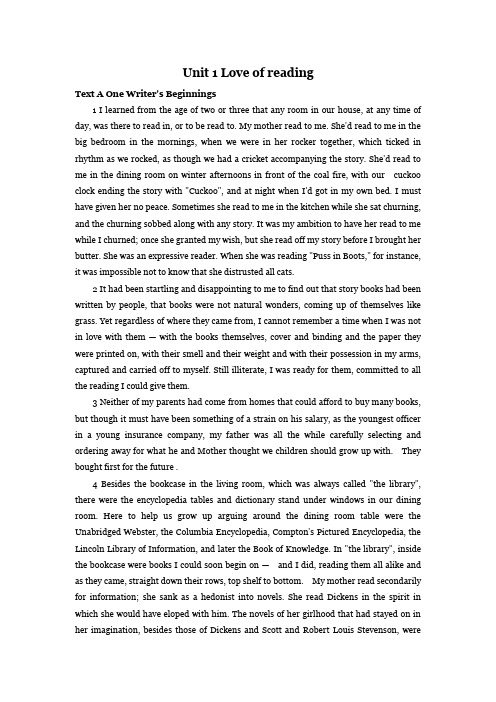
Unit 1 Love of readingText A One Writer's Beginnings1 I learned from the age of two or three that any room in our house, at any time of day, was there to read in, or to be read to. My mother read to me. She'd read to me in the big bedroom in the mornings, when we were in her rocker together, which ticked in rhythm as we rocked, as though we had a cricket accompanying the story. She'd read to me in the dining room on winter afternoons in front of the coal fire, with our cuckoo clock ending the story with "Cuckoo", and at night when I'd got in my own bed. I must have given her no peace. Sometimes she read to me in the kitchen while she sat churning, and the churning sobbed along with any story. It was my ambition to have her read to me while I churned; once she granted my wish, but she read off my story before I brought her butter. She was an expressive reader. When she was reading "Puss in Boots," for instance, it was impossible not to know that she distrusted all cats.2 It had been startling and disappointing to me to find out that story books had been written by people, that books were not natural wonders, coming up of themselves like grass. Yet regardless of where they came from, I cannot remember a time when I was not in love with them —with the books themselves, cover and binding and the paper they were printed on, with their smell and their weight and with their possession in my arms, captured and carried off to myself. Still illiterate, I was ready for them, committed to all the reading I could give them.3 Neither of my parents had come from homes that could afford to buy many books, but though it must have been something of a strain on his salary, as the youngest officer in a young insurance company, my father was all the while carefully selecting and ordering away for what he and Mother thought we children should grow up with. They bought first for the future .4 Besides the bookcase in the living room, which was always called "the library", there were the encyclopedia tables and dictionary stand under windows in our dining room. Here to help us grow up arguing around the dining room table were the Unabridged Webster, the Columbia Encyclopedia, Compton's Pictured Encyclopedia, the Lincoln Library of Information, and later the Book of Knowledge. In "the library", inside the bookcase were books I could soon begin on —and I did, reading them all alike and as they came, straight down their rows, top shelf to bottom. My mother read secondarily for information; she sank as a hedonist into novels. She read Dickens in the spirit in which she would have eloped with him. The novels of her girlhood that had stayed on in her imagination, besides those of Dickens and Scott and Robert Louis Stevenson, wereJane Eyre, Trilby, The Woman in White, Green Mansions, King Solomon's Mines.5 To both my parents I owe my early acquaintance with a beloved Mark Twain. There was a full set of Mark Twain and a short set of Ring Lardner in our bookcase, and those were the volumes that in time united us all, parents and children.6 Reading everything that stood before me was how I came upon a worn old book that had belonged to my father as a child. It was called Sanford and Merton. Is there anyone left who recognizes it, I wonder? It is the famous moral tale written by Thomas Day in the 1780s, but of him no mention is made on the title page of this book; here it is Sanford and Merton in Words of One Syllable by Mary Godolphin. Here are the rich boy and the poor boy and Mr. Barlow, their teacher and interlocutor, in long discourses alternating with dramatic scenes —anger and rescue allotted to the rich and the poor respectively. It ends with not one but two morals, both engraved on rings: "Do what you ought, come what may," and "If we would be great, we must first learn to be good."7 This book was lacking its front cover, the back held on by strips of pasted paper, now turned golden, in several layers, and the pages stained, flecked, and tattered around the edges; its garish illustrations had come unattached but were preserved, laid in. I had the feeling even in my heedless childhood that this was the only book my father as a little boy had had of his own. He had held onto it, and might have gone to sleep on its coverless face: he had lost his mother when he was seven. My father had never made any mention to his own children of the book, but he had brought it along with him from Ohio to our house and shelved it in our bookcase.8 My mother had brought from West Virginia that set of Dickens: those books looked sad, too — they had been through fire and water before I was born, she told me, and there they were, lined up — as I later realized, waiting for me.9 I was presented, from as early as I can remember, with books of my own, which appeared on my birthday and Christmas morning. Indeed, my parents could not give me books enough. They must have sacrificed to give me on my sixth or seventh birthday — it was after I became a reader for myself-the ten-volume set of Our Wonder World. These were beautifully made, heavy books I would lie down with on the floor in front of the dining room hearth, and more often than the rest volume 5, Every Child's Story Book, was under my eyes. There were the fairy tales —Grimm, Andersen, the English, the French, "Ali Baba and the Forty Thieves"; and there was Aesop and Reynard the Fox; there were the myths and legends, Robin Hood, King Arthur, and St. George and the Dragon, even the history of Joan of Arc; a whack of Pilgrim's Progress and a long piece of Gulliver. They all carried their classic illustrations. I located myself in these pages andcould go straight to the stories and pictures I loved; very often "The Yellow Dwarf" was first choice, with Walter Crane's Yellow Dwarf in full color making his terrifying appearance flanked by turkeys. Now that volume is as worn and backless and hanging apart as my father's poor Sanford and Merton. One measure of my love for Our Wonder World was that for a long time I wondered if I would go through fire and water for it as my mother had done for Charles Dickens; and the only comfort was to think I could ask my mother to do it for me.10 I believe I'm the only child I know of who grew up with this treasure in the house.I used to ask others, "Did you have Our Wonder World?" I'd have to tell them The Book of Knowledge could not hold a candle to it.11 I live in gratitude to my parents for initiating me —as early as I begged for it, without keeping me waiting — into knowledge of the word, into reading and spelling, by way of the alphabet. They taught it to me at home in time for me to begin to read before starting to school.12 Ever since I was first read to, then started reading to myself, there has never beena line read that I didn't hear. As my eyes followed the sentence, a voice was saying it silently to me. It isn't my mother's voice, or the voice of any person I can identify, certainly not my own. It is human, but inward, and it is inwardly that I listen to it. It is to me the voice of the story or the poem itself. The cadence, whatever it is that asks you to believe, the feeling that resides in the printed word, reaches me through the reader-voice: I have supposed, but never found out, that this is the case with all readers — to read as listeners — and with all writers, to write as listeners. It may be part of the desire to write. The sound of what falls on the page begins the process of testing it for truth , for me. Whether I am right to trust so far I don't know. By now I don't know whether I could do either one, reading or writing, without the other.13 My own words, when I am at work on a story, I hear too as they go, in the same voice that I hear when I read in books. When I write and the sound of it comes back to my ears, then I act to make my changes. I have always trusted this voice.作家起步时我从两三岁起就知道,家中随便在哪个房间里,白天无论在什么时间,都可以念书或听人念书。
新编英语教程5Unit1-8课文及译文参考
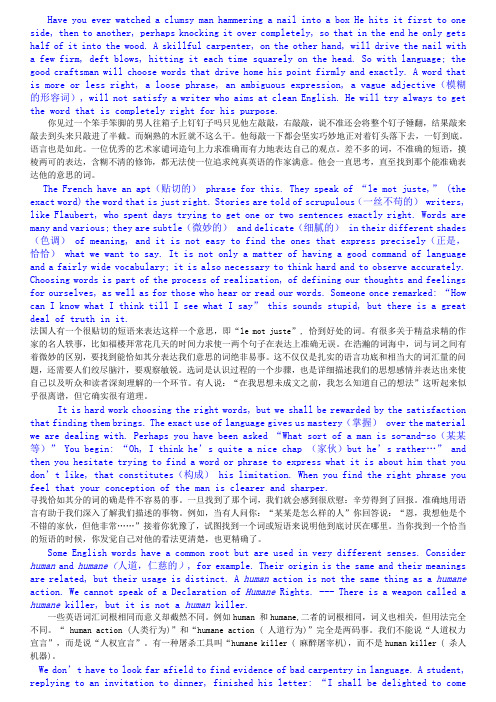
Have you ever watched a clumsy man hammering a nail into a box He hits it first to one side, then to another, perhaps knocking it over completely, so that in the end he only gets half of it into the wood. A skillful carpenter, on the other hand, will drive the nail with a few firm, deft blows, hitting it each time squarely on the head. So with language; the good craftsman will choose words that drive home his point firmly and exactly. A word that is more or less right, a loose phrase, an ambiguous expression, a vague adjective(模糊的形容词), will not satisfy a writer who aims at clean English. He will try always to get the word that is completely right for his purpose.你见过一个笨手笨脚的男人往箱子上钉钉子吗只见他左敲敲,右敲敲,说不准还会将整个钉子锤翻,结果敲来敲去到头来只敲进了半截。
而娴熟的木匠就不这么干。
他每敲一下都会坚实巧妙地正对着钉头落下去,一钉到底。
语言也是如此。
一位优秀的艺术家谴词造句上力求准确而有力地表达自己的观点。
差不多的词,不准确的短语,摸棱两可的表达,含糊不清的修饰,都无法使一位追求纯真英语的作家满意。
李观仪《新编英语教程(5)》(第3版)学习指南【词汇短语+课文精解+全文翻译+练习答案】
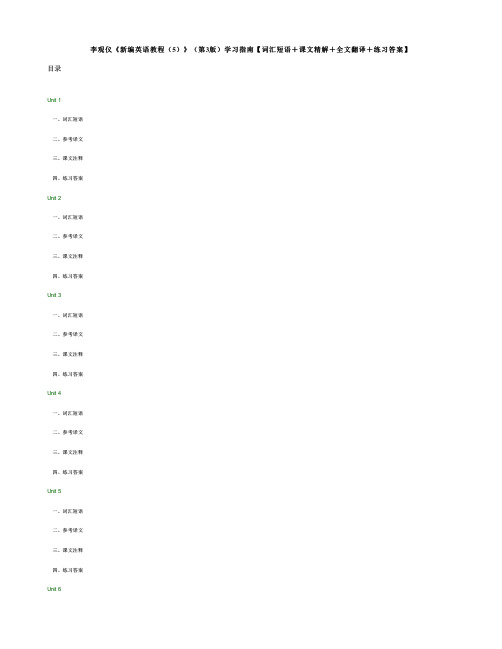
李观仪《新编英语教程(5)》(第3版)学习指南【词汇短语+课文精解+全文翻译+练习答案】目录Unit 1 一、词汇短语 二、参考译文 三、课文注释 四、练习答案Unit 2 一、词汇短语 二、参考译文 三、课文注释 四、练习答案Unit 3 一、词汇短语 二、参考译文 三、课文注释 四、练习答案Unit 4 一、词汇短语 二、参考译文 三、课文注释 四、练习答案Unit 5 一、词汇短语 二、参考译文 三、课文注释 四、练习答案Unit 6 一、词汇短语 二、参考译文 三、课文注释 四、练习答案Unit 7 一、词汇短语 二、参考译文 三、课文注释 四、练习答案Unit 8 一、词汇短语 二、参考译文 三、课文注释 四、练习答案Unit 9 一、词汇短语 二、参考译文 三、课文注释 四、练习答案Unit 10 一、词汇短语 二、参考译文 三、课文注释 四、练习答案Unit 11 一、词汇短语 二、参考译文 三、课文注释 四、练习答案Unit 12 一、词汇短语 二、参考译文 三、课文注释 四、练习答案弘博学习网————各类考试资料全收录内容简介《新编英语教程(第3版)学习指南》按照原教材的课次进行编写,每单元涉及单元语法、词汇短语、参考译文、课文精解以及练习答案等内容,旨在帮助学生更好、更高效地学习和掌握教材中的重点及难点知识,具有很强的针对性和实用性。
在编写过程中,该书力求突出重点,答疑难点,语言言简意赅,讲解深入浅出,希望它能得到广大英语专业学生和英语自学者的喜爱和认可。
弘博学习网————各类考试资料全收录Unit 1一、词汇短语Text I1clumsy [5klQmzi] adj. moving or doing things in a very awkward way 笨拙的,拙劣的:I spilt your coffee. Sorry—that was clumsy of me.我把你的咖啡弄洒了。
- 1、下载文档前请自行甄别文档内容的完整性,平台不提供额外的编辑、内容补充、找答案等附加服务。
- 2、"仅部分预览"的文档,不可在线预览部分如存在完整性等问题,可反馈申请退款(可完整预览的文档不适用该条件!)。
- 3、如文档侵犯您的权益,请联系客服反馈,我们会尽快为您处理(人工客服工作时间:9:00-18:30)。
Unit61, 如果对这器械有什么不清楚的地方,你可以写信到我们总公司去询问。
If there is anything you are not clear about the device, address your inquiry to your head office. 2, 在执行计划之前,我们最好把它的每一个方面仔细考虑,看看是否切实可行。
Before we put the new plan into practice, we had bitter scrutinize every aspect of it to make sure t hat it is practicable.3, 在新的规章执行后,我们预期这地区的情况会有好转。
We expect that there will be a change for the better in this area after the new regulations are imple mented.4, 不要把他的话当真,他仅仅是开个玩笑而已。
Don’t take his words literally. He is just cracking a joke.5, 在农业中应用固氮作用良好。
The prospect of employing (nitrogen fixation) in agriculture is promising.6, 他想发明一种不留痕迹的改正液的企图以失败告终。
His attempt at contriving a correcting fluid which leaves no marks on paper ended in failure.7, 那个外国人不会说汉语。
他用手势表达他的要求。
但是他无法把他的意思表达来。
The non-Chinese-speaking foreigner gestured to make a requested, but he just couldn’tget his idea across.8, 他不考虑这件事的迫切性而断然拒绝了,不留一丝余地。
Without considering the urgency of the matter, he gave us a flat refusal, once and for all.Unit71.他怪异行为有悖于一般的良好行为规范。
His strange behavior runs counter to the popular concept of good conduct.2. 可以肯定的是世界上鲜有人能同时在数学和科学领域的成就比牛顿更突出。
It is certain that few people in the world could have made such a great impact on the development of science and mathematics than Isaac Newton.3.你不该嘲笑孩子的失败,应鼓励他们再去尝试。
You are not suppose to deride the children for their failures; instead you should encourage them to try again,instead.4.在Judy毕业典礼的那天,她的叔叔婶婶以丰盛的晚餐来款待她。
On her graduation day, Judy was treated to a sumptuous dinner by her uncle and aunt.5.对于他在公司的过往表现,没有人有什么不满。
With respect to his past record in the firm , no one has anything to complain about.6.他们的自由和我们的自由息息相关,我们不能单独行动。
Their freedom is inextricably bound to ours. We cannot act alone.7.我年迈的叔祖母不习惯使用市场上盛行的一次性物品。
My aged great aunt is not used to disposable products which flood the market today.8.他在考试中作弊被抓住后,名字马上从应考者名单上删去。
His name was immediately eliminatedfrom the list of candidates after he was caught cheating in the exam.Unit81.他企图影射John是肇事者,结果是徒劳的。
His attempt at insinuating that John was the culprit turned out to be futile.2.当他未能完成期望他做的事时,他很善于临时找个借口来为自己开脱。
He is very clever at improvising excuses when he fails to de what is expected of him.3.他此行去西藏可以满足他想参观布达拉宫的愿望了。
His trip to Tibet will gratify his desire to see the Potala.4.这个公司人力资源雄厚,足以应对其他大公司的挑战。
This corporation commandsdistinguished human resources,rich enough to meet challenges from other big corporations.5.我认为这恐怕不是我们双方都能接受的变通办法。
我们难道想不出来一个更好的方案来处理这个问题?I don’t think that could be an acceptable alternative for both of us.Can’t we come up with a better one for this problem?6.总爱胡思乱想和动不动就心血来潮都是有害的。
It is harmful to indulge in whims and caprices.7.对不属于你的东西不要作非分之想。
Try not to lay your hands on anything that you are not entitled to.8.他没有来参加竞赛。
可能把这件事全部忘记了。
He did not come to the competition. It may well be that he had forgotten all about it.Unit91.比赛的结果不仅取决于球员的个人技术,还取决于全队所有球员能否把握好时机。
The outcome of the game depends not just on the skills of individual players but also on the timing of all the player of the team.2.接下来我想问的是,我们如何维持一个恒定的自我呢?What I want to ask next is how we could sustain a constant self-identity?3.从迷梦中醒悟过来之后他为自己所做的蠢事感到可耻.He felt ashamed of himself for the foolish thing he had done when his infatuation was over.4.皮肤科的医生告诫人们要小心阳光的直射,因为会有患皮肤癌的危险。
Skin doctor warm people to be careful with direct sun exposure because of the risk of skon cancer.5.她的头部伤得很厉害,但是她最终还是爬出了窗口。
Her head was seriously injured,but she eventually managed to climb out of the window.6.我们该怎么做才能使我们的展览摊位比别人的更突出呢?How can we make our exhibit booth stand out from the others?7.他设法冒充一名绅士,但每个人都知道他只是一个暴发户。
He tried to pass for a gentleman;but everyone knew he was just an upstart.8.他强调说,政界人士和媒体评论员都应该在言辞上有所冷静。
He stresses that both politicians and commentators in the media need to cool their rhetoric.Unit101.习俗不同于传统在于前者是一个社会中一般被接受的行为规范,而后者则是指从过去传到现在的思维和行为的习惯方式。
Conventions are different from tradition in that the former are the generally accepted standards of behavior in a society, whereas the latter refers to the customary way of thinking or behaving that has been passed down from the past to the present.2.孔孟之道在很长一段时期内统治着中国社会。
For a long time the teaching of Confucius and Mencius held way over Chinese society.3.他的潦草书写只有他自己看得懂。
His scribbling is unintelligible to any one but himself.4.我们必须在有可能发生最坏事态的前提下采取行动。
We must act on the premise that the worst can happen.5.早在儿童学会说话和理解口头语言之前,他们就掌握了通过比较视觉外观的差异来辨识物体的能力。
Long before children are capable of using and understanding verbal language,they possess the ability to differentiate between objects with visual difference.6.植物园的一个显著特色就是它的面积宽广。
